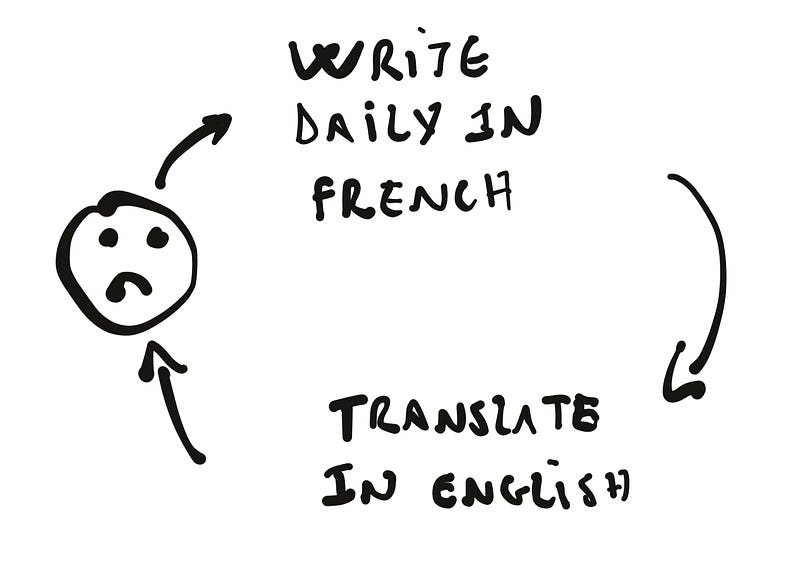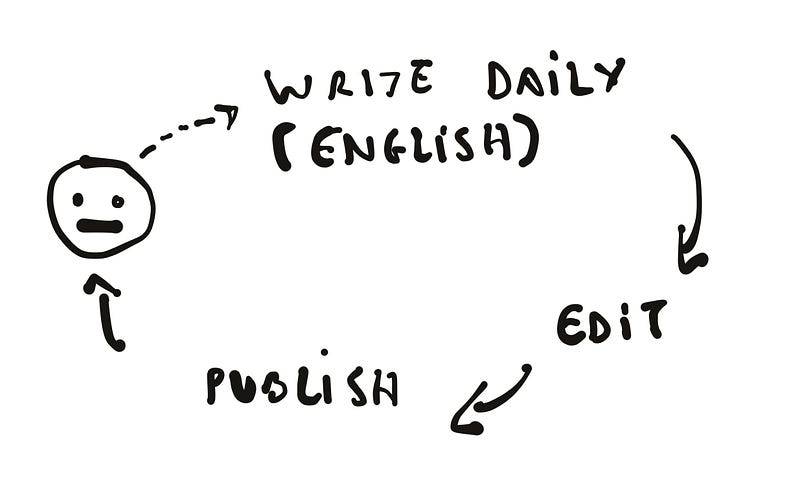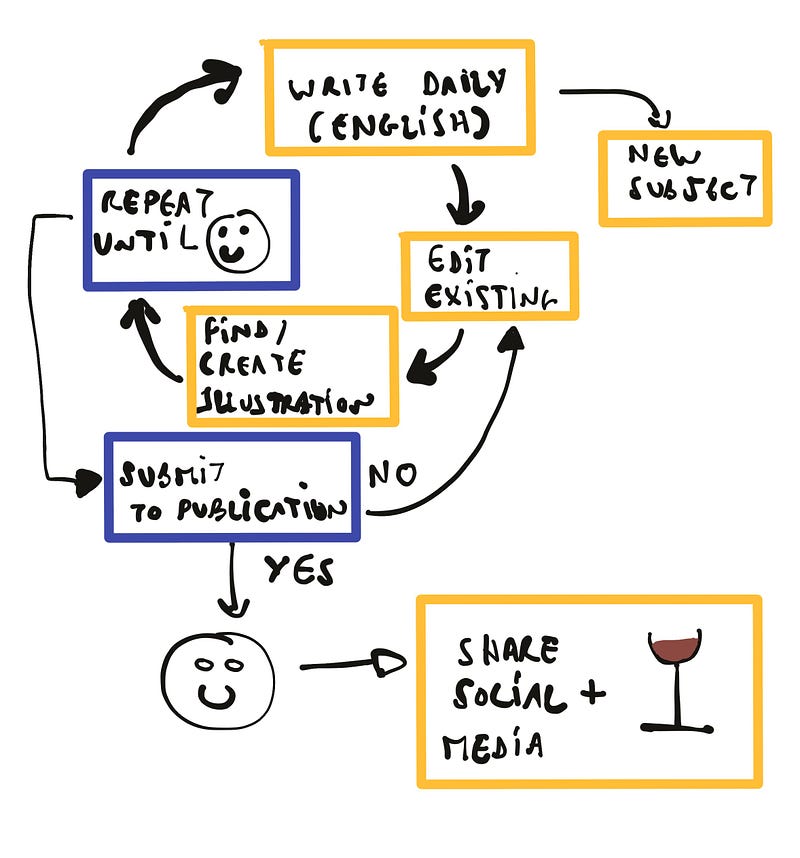I Am Not a Writer — Not Even a Native English Speaker
I Am Not a Writer — Not Even a Native English Speaker#
How I published 16 articles in 2019 and enjoyed the experience#
Why then, should I publish an article about writing?
In 2019, I relocated from a french speaking Canadian city (Sherbrooke, Quebec) to the national capital (Ottawa, Ontario). I had been working in an English environment since I joined Shopify a few months earlier. With my lead, we identified English communications as an area of improvement. We decided to focus on written communication.
Even though I have a Ph.D. in physics, I felt a prisoner of my grade 5 grammar and spelling proficiencies. Writing in English was comparable to being an adult in the body of a child — articulated but not able to break the communication barrier. Here is my personal 2019 writer story.
To become a writer, you need to press the publish button!
Learning with deliberate practice#
I know how I learn. Everybody is different in this regard, but I learn by doing. Practice makes perfect is my personal motto. I made my first writing attempts in early 2019. I started writing content in French. Then, I would translate the articles in English.

It was painful and slow. While translating, I struggled with the order of words and especially verbs. The end-result never felt like natural English and not even like flowing English.
Worse, I did not feel like a writer at all but more like an incompetent translator. I was actively creating problems for myself! My goal was to learn how to write, not how to translate.
What has proven helpful for me was the habit of deciding the day before, the subject of tomorrow’s writing session.
Life is change: focus and prioritization#
Based on these new learnings, I switched to writing in English.

I also had a pet project — I operated my own Linux and Wordpress server. I stopped these activities when I decided to switch to Medium. This gave me more time. With these choices, I was able to get back a few hours a week to write more.
Habits, Ideas and Tools#
Even when doing my poor translation tasks, I kept the habit of writing regularly: daily to be precise. My daily routine did not change: waking up early, meditating and writing. My daily writing time went from ten minutes at the beginning of the year to close to one hour these days.
I don’t have a specific format for my daily writing practice. It can be quick notes, ideas or even longer stories. However, I don’t like starting with a blank page or an empty mental space. What has proven helpful for me was the habit of deciding the day before, the subject of tomorrow’s writing session. Having a self-imposed subject is giving me space to find ideas, experiences, pick-up cues from my environment and even, sometimes, dream about it. With time, I wrote about various subjects: science-fiction, how-to, product management or personal well-being.
I have found two useful apps to help simplify my English and also improve its overall quality. My goal was not to develop my style but to learn how to stop making the most basic grammatical and syntactical errors. I found two apps that I love: Hemingway (macOS only) and later this year Grammarly (semi cross-platform: in-browser editor).
Both of these apps were tremendously helpful. They allowed me to learn English grammar as I practiced. Grammarly premium explains the rules, proposes synonyms and helped correct my worse defects.
I also started to write on the iPad and discovered various creative programs. I added some visual schema to my writer toolbox — mainly to illustrate half-baked articles in French or English. Learning along the way and always trying to increase my own understanding as well as my reader’s one. Schema helps me to understand and explain better. Lots of the schema and illustrations I created are not published: they are simply part of my research.
For the longer pieces, not a single word remained of the original!
Editing is a thing!#
I rarely edited my drafts before publishing my content. I naively believed I was clear. In fact, I was not really reading what I had written but simply confirming the bias of my own ideas and mental models! And truth be said, with all the research and activities … they were quite clear but only for a single reader: me.

I introduced the sleep on it rule. I never publish anything the first day and I wait at least 2 days before re-reading and editing any article. I do this only when I am pleased with the content and the article structure. For the longer pieces, not a single word remained of the original!
Don’t get me wrong: I am not an expert, and at this point in time, I am not even a write. I was discovering a process that works for me:
- Generate ideas / outlines / schemas
- Wait at least two days
- Edit it: remove all superfluous words and sections. Make it interesting and easy to read + understand for your audience
Hit the publish button#
I published some loosely connected articles on my own publications. I wanted to learn how Medium worked in order to get some experience with the publishing tools (revisions, comments, TK, medium+grammarly, etc.). I also wanted to get comfortable with the publish button.
As you can imagine, besides my friends and family, I only had a few readers. Even today, I don’t have any goals in terms of audience, views and read. Some subjects are very technical and affect a smaller audience while others are shared by all humans. Each time I publish an article, I have to fight my own fears, uncertainties and doubt. This became my mantra: To become a writer, you need to press the publish button!
I am truly humbled by how many hours readers have spent on my imperfect work.
Make it personal#
The first articles were, if not dull, let’s say barely readable. They remained at a high abstraction level and were not really based on my personal experience. I was hiding behind other people’s thoughts, books and ideas.
I have been a long-time meditation and Buddhist practitioner. As I collected years and grey hairs, I was also busy collecting tools and mental models, which helped me be a more fulfilled, calmer and, in general, happier person. I decided to focus on these experiences and did a semi-long form essay (6000 words initially, stripped down to its 2500 words in its final form) and submitted it to a publication I respect and love: Better Human.
I was humbled when I received the answer: yes, this is an exciting subject. Better Human wanted to publish it! I signed the contract, barely believing I could call myself a writer.
Reinforce your writing skills: extra practice at work#
Soon after this great news, at work, I had an opportunity to contribute to a new section of our documentation. A few months ago, I would have politely declined, knowing very well that my English was limited and not good enough for prime time. However, given my recent experiences, as a writer, I decided to practice and contribute. My short piece was, of course, heavily edited but then published (importance of processing time for Shopify merchants).
I was able to apply all my learnings from the year and use them in a completely different setup. I was writing for a completely different audience, using a completely different toolset and writing style. But the process remained identical: write and edit daily, savagely edit until I was happy with the result and then propose it for publication. I was then fortunate to work closely with a wonderful illustrator as well as the editor. Even if writing is a solitary effort it is also a team sport.
Being rejected is good for you#
I also was rejected for a few publications. I did not take it personally. It forced me to reconsider the ideas, article and structure of the story.
These days I am busy splitting one long piece I had written that was rejected into multiple independent stories so that I can submit again.
Practice makes perfect!
Conclusion#
From a writing point of view, 2019 was a blast. I went full circle: from deciding to learn a new skill to being able to make a difference. This journey was challenging, interesting and fulfilling.
Today, I understand better what the creative process is for any written content. I enjoy each step of the process. This is now part of my daily routine like meditating, physical activity and brushing my teeth.
Seeing 2020#
For 2020, I want to continue my deliberate practice by improving in three particular areas:
- Be more personal: tackle more personal subjects (like this article!)
- Write actionable and immediately useful (in opposition to new ideas, framework and hard to use written material)
- Experiment with long content. I am quite scared of this one: this is a process I know nothing about but I am eager to try.
My experiences this year also highlighted the importance of editing my stories to affect more readers. I need more practice and also to experiment more to find my own voice.
I am truly humbled by how many hours readers have spent on my imperfect work.
Feedback is a gift 🙏: Please do not hesitate to share your thoughtsts
- via the contact page form
- via a LinkedIn connexion or message